2025年中考英语复习 第9节 动词的时态-课件
文档属性
| 名称 | 2025年中考英语复习 第9节 动词的时态-课件 |  | |
| 格式 | pptx | ||
| 文件大小 | 181.0KB | ||
| 资源类型 | 试卷 | ||
| 版本资源 | 通用版 | ||
| 科目 | 英语 | ||
| 更新时间 | 2025-01-21 16:22:30 | ||
图片预览


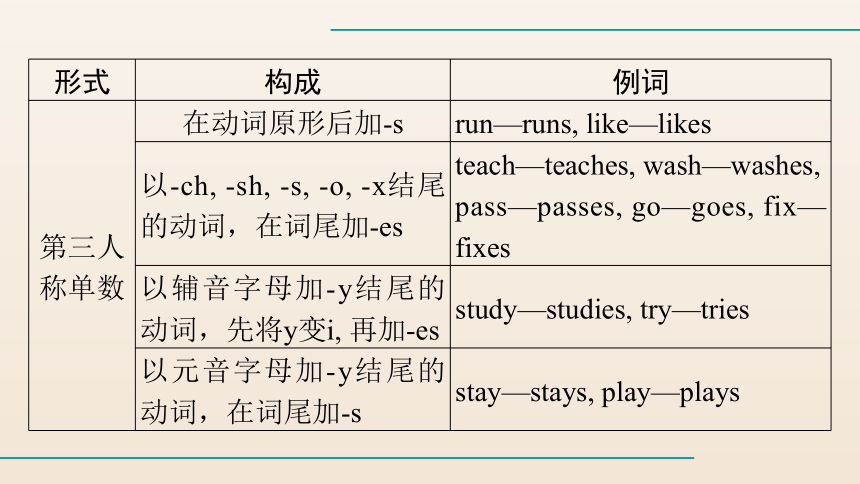
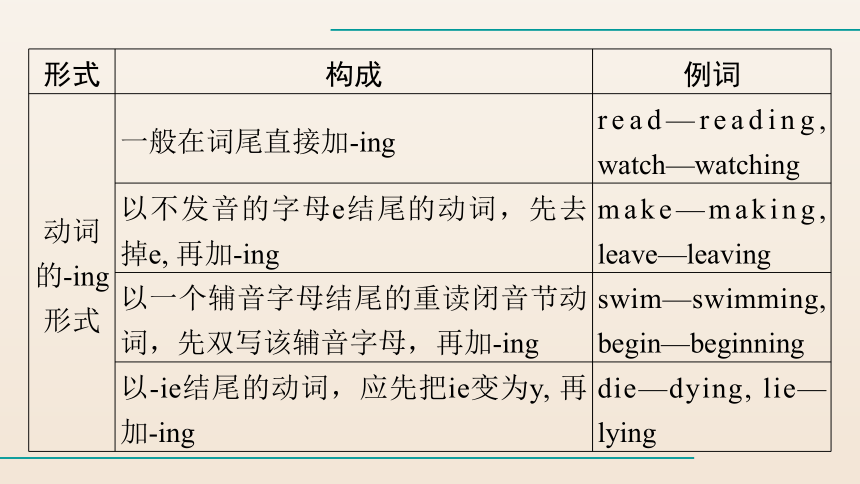
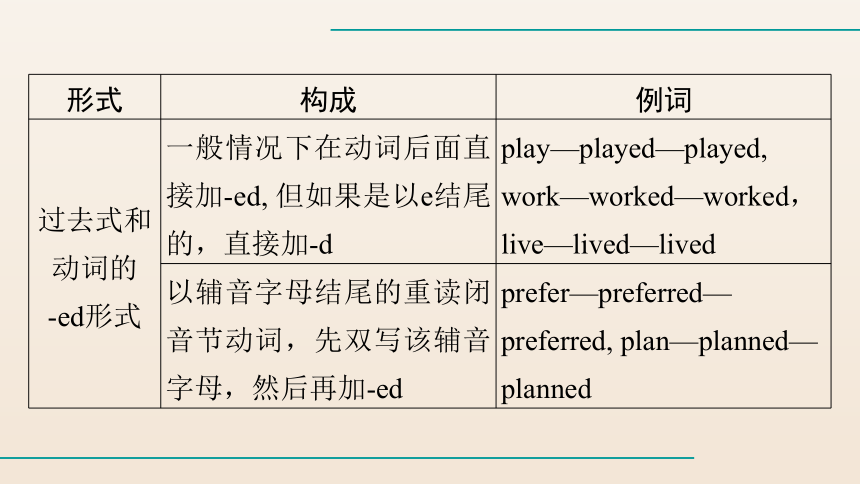
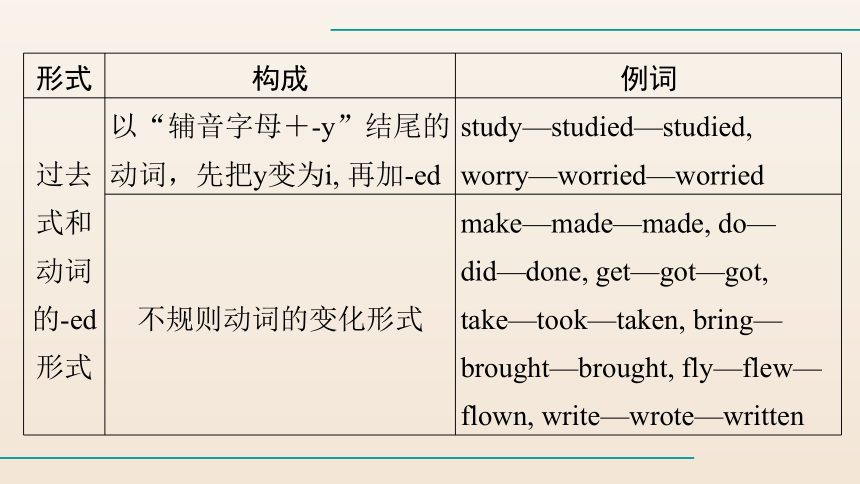

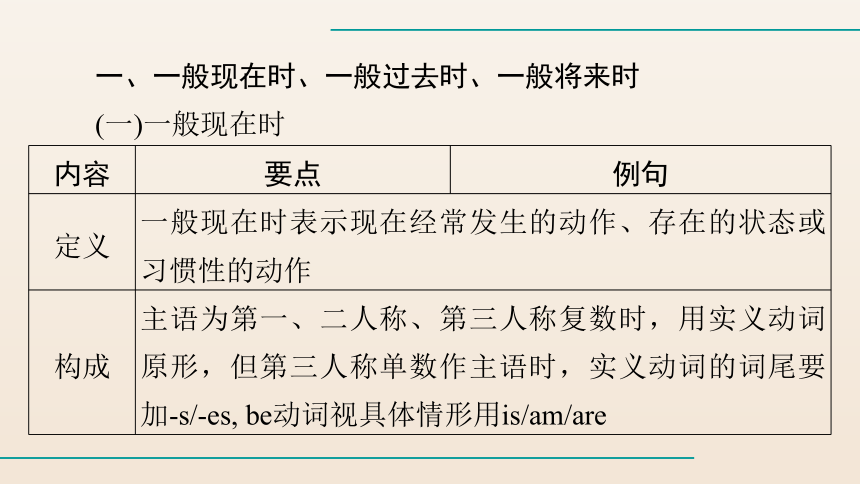
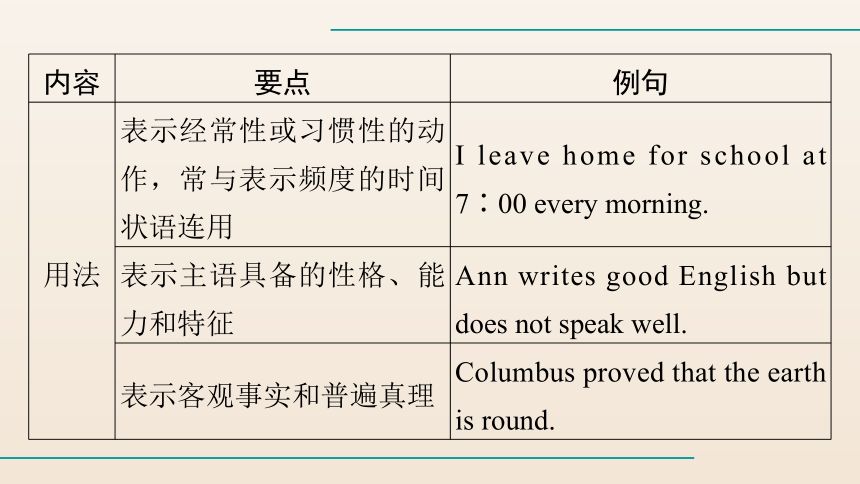
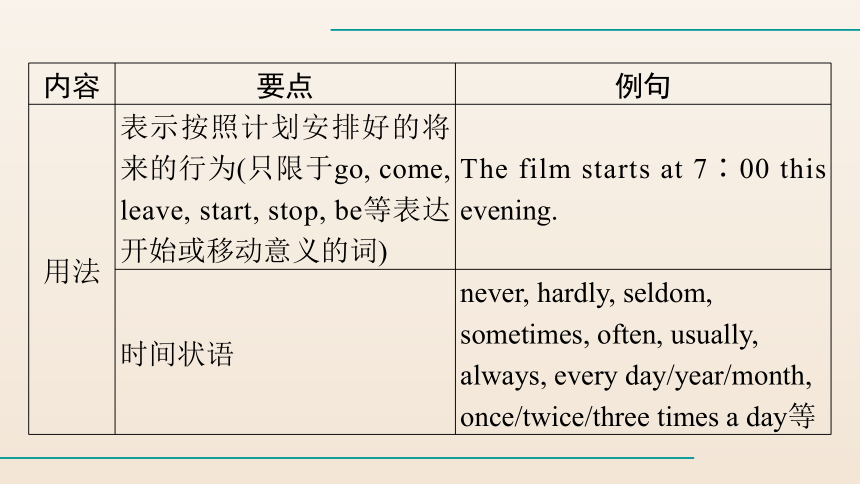
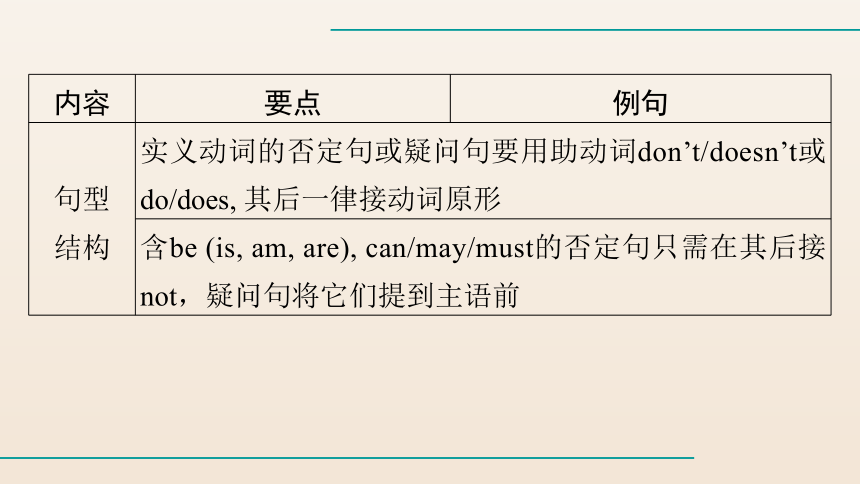
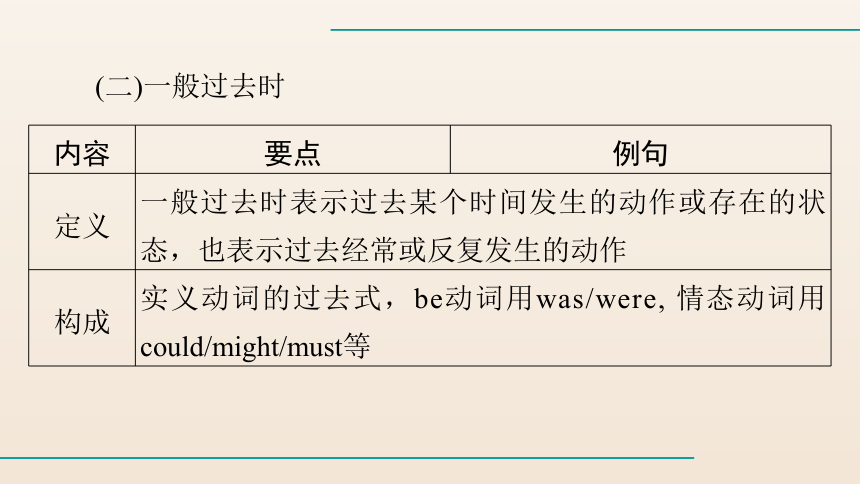
文档简介
(共60张PPT)
第一部分 中考语法知识
第九节 动词的时态
考点一:动词的形式及变化情况
英语动词的五种基本形式为:动词原形、第三人称单数、动词的-ing形式、动词的-ed形式和过去式。详见动词的五种基本形式变化表:
形式 构成 例词
动词原形 不带to的动词不定式形式,也就是词典中给出的基本形式 be, have, do, learn
语法精炼
形式 构成 例词
第三人称单数 在动词原形后加-s run—runs, like—likes
以-ch, -sh, -s, -o, -x结尾的动词,在词尾加-es teach—teaches, wash—washes, pass—passes, go—goes, fix—fixes
以辅音字母加-y结尾的动词,先将y变i, 再加-es study—studies, try—tries
以元音字母加-y结尾的动词,在词尾加-s stay—stays, play—plays
形式 构成 例词
动词的-ing形式 一般在词尾直接加-ing read—reading, watch—watching
以不发音的字母e结尾的动词,先去掉e, 再加-ing make—making, leave—leaving
以一个辅音字母结尾的重读闭音节动词,先双写该辅音字母,再加-ing swim—swimming, begin—beginning
以-ie结尾的动词,应先把ie变为y, 再加-ing die—dying, lie—lying
形式 构成 例词
过去式和动词的 -ed形式 一般情况下在动词后面直接加-ed, 但如果是以e结尾的,直接加-d play—played—played, work—worked—worked,
live—lived—lived
以辅音字母结尾的重读闭音节动词,先双写该辅音字母,然后再加-ed prefer—preferred—preferred, plan—planned—planned
形式 构成 例词
过去式和动词的-ed形式 以“辅音字母+-y”结尾的动词,先把y变为i, 再加-ed study—studied—studied, worry—worried—worried
不规则动词的变化形式 make—made—made, do—did—done, get—got—got, take—took—taken, bring—brought—brought, fly—flew—flown, write—wrote—written
考点二:动词的八种时态
所谓时态,就是通过动词的不同变化形式来表达不同时间内发生的动作或存在的状态。
英语动词常用的时态有八种:一般现在时、一般过去时、一般将来时、现在进行时、过去进行时、现在完成时、过去完成时和过去将来时。根据《义务教育英语课程标准》的要求,本书将复习其中的六种时态。
一、一般现在时、一般过去时、一般将来时
(一)一般现在时
内容 要点 例句
定义 一般现在时表示现在经常发生的动作、存在的状态或习惯性的动作 构成 主语为第一、二人称、第三人称复数时,用实义动词原形,但第三人称单数作主语时,实义动词的词尾要加-s/-es, be动词视具体情形用is/am/are 内容 要点 例句
用法 表示经常性或习惯性的动作,常与表示频度的时间状语连用 I leave home for school at 7∶00 every morning.
表示主语具备的性格、能力和特征 Ann writes good English but does not speak well.
表示客观事实和普遍真理 Columbus proved that the earth is round.
内容 要点 例句
用法 表示按照计划安排好的将来的行为(只限于go, come, leave, start, stop, be等表达开始或移动意义的词) The film starts at 7∶00 this evening.
时间状语 never, hardly, seldom, sometimes, often, usually, always, every day/year/month, once/twice/three times a day等
内容 要点 例句
句型 结构 实义动词的否定句或疑问句要用助动词don’t/doesn’t或do/does, 其后一律接动词原形 含be (is, am, are), can/may/must的否定句只需在其后接not,疑问句将它们提到主语前 (二)一般过去时
内容 要点 例句
定义 一般过去时表示过去某个时间发生的动作或存在的状态,也表示过去经常或反复发生的动作 构成 实义动词的过去式,be动词用was/were, 情态动词用could/might/must等 内容 要点 例句
用法 表示过去某个特定时间发生的动作或存在的状态 Tom didn’t come to class yesterday.
表示过去的习惯性或经常发生的动作(注意:表示过去经常或反复发生的动作,还可用“used to/would+动词原形”) I went to the cinema once a week when I was at school.
She used to go for a walk after supper.
在条件、时间状语从句中,常用一般过去时代替过去将来时 They said they would let us know if they heard any news about him.
内容 要点 例句
时间状语 表示过去的时间yesterday, last night, in 1990以及often, always等表示频度的时间状语 句型结构 与一般现在时一样,若为实义动词,变否定句或疑问句时要借助助动词didn’t或did, 后接动词原形;若为be动词或情态动词,则只需在它们后面加not或将其提到主语前 (三)一般将来时
内容 要点 例句
定义 一般将来时表示将要发生的动作或存在的状态以及打算、计划或准备做某事 构成 (1)be going to+do(动词原形);(2)will(用于任何人称)/shall(第一人称)+do(动词原形); (3)be+doing(动词的-ing形式) 内容 要点 例句
用法 事先经过考虑、打算、计划要做的事情 We’re going to meet outside the school gate.
根据已有迹象表明必将发生的事 Look at the black clouds! It’s going to rain.
即将要发生的动作或存在的状态 We will have a meeting tomorrow.
在含有时间或条件状语从句的复合句中,当主句和从句的动作均发生在将来时,通常主句用一般将来时,从句用一般现在时,即“主将从现” We will go to the park if it doesn’t rain tomorrow.
内容 要点 例句
时间状语 tomorrow, soon或短语next year/week/month, in a few days等以及含有when, if等的复合句中 句型结构 否定句改为be not/will not (won’t), 疑问句只需将be/will提到主语前 【针对练习】
( )1.(2024 广州改编,2)The two kids carefully climbed onto the rocks and ______ over.
A.look B.looking
C.looked D.to look
C
( )2.(2024 宿迁,7)To make our hometown more beautiful, we ______ many trees and flowers every year.
A.plant B.are planting
C.planted D.were planting
( )3.Unless the weather ______ , we’ll have to cancel the picnic.
A.improve B.improves
C.improved D.will improve
A
B
( )4.With the development of science and technology, robot cooks ______ in our families in the future.
A.appear B.appeared
C.will appear D.were appearing
C
( )5.—Sir, Jenny wants to know when she can leave the office.
—Only when she ______ copying this report.
A.finishes B.finish
C.finished D.will finish
A
二、现在进行时、过去进行时
(一)现在进行时
内容 要点 例句
定义 现在进行时表示(说话时)正在进行或发生的动作;也可表示现阶段一直或反复进行的动作 构成 be (am/is/are)+doing(动词的-ing形式) 内容 要点 例句
用法 表示说话时正在进行或发生的动作 I’m studying now.
表示说话时相对较长一段时间内正在进行的动作 He is building his own house these days.
表示动作即将发生或正在进行 He is joining the army.
内容 要点 例句
时间 状语 表示现在的时间暗示语或现阶段的时间,如listen, look, at the moment, now, these days, at present, from two to five等,或含有when/while的时间状语从句 句型结构 其否定句只需在be后加not,疑问句将be提到主语前 (二)过去进行时
内容 要点 例句
定义 过去进行时表示过去某个时间点或过去某时间段正在进行的动作 构成 was/were+doing(动词的-ing形式) 内容 要点 例句
用法 表示过去某个时间点正在进行的动作 What was she doing at nine o’clock yesterday?
表示过去某个时间段正在进行的动作 We were watching TV from 7∶00 to 9∶00 last night.
内容 要点 例句
用法 在复合句中,如果主要动作和背景动作都是延续的或同时发生的,那么主、从句的动词都可用过去进行时 While he was waiting for the bus, he was reading a newspaper.
在主句为一般过去时的宾语从句中,过去进行时用来表示过去的将来 She said she was leaving for Shanghai.
内容 要点 例句
时间状语 at nine last night, at that time, at this time yesterday, this morning, the whole morning, all day yesterday等,或含有when/while的时间状语从句 句型结构 与现在进行时一样,其否定或疑问形式只需改变be(was/were)的形式或位置 【针对练习】
( )1.(2024 北京,9)—Amy, you didn’t answer my call yesterday evening. What were you doing
—Sorry, I didn’t hear the ring. I ______ a book in my study.
A.am reading B.have read
C.was reading D.will read
C
( )2.(2024 江西,4)—Where is Helen
—I’m not sure. Maybe she ______ her baseball lesson.
A.had B.was having
C.is having D.will have
C
( )3.(2024 泸州,9)—Hi, Ethan. I called you at 8∶00 last night, but you didn’t answer.
—Sorry, I ______ the dishes.
A.wash B.washed
C.am washing D.was washing
D
( )4.(2024 云南,7)—Helen, I didn’t see you in the classroom at five yesterday afternoon.
—Oh, I ______ singing for the graduation ceremony at that time.
A.will practice B.have practiced
C.am practicing D.was practicing
D
( ) 5.Today’s young people can’t live without smartphones. They keep their hands on the phones whenever they go, even while they ______ meals.
A.had B.will have
C.are having D.were having
C
三、现在完成时
内容 要点 例句
定义 现在完成时表示开始于过去、持续到现在的动作或状态,并可能继续下去(也可能不继续下去);也可以表示过去发生或已完成的某个动作对现在产生的影响或结果 构成 助动词have/has(主语为第三人称单数时)+done(动词的-ed形式) 内容 要点 例句
用法 表示开始于过去、持续到现在的动作或状态,并可能继续下去(也可能不继续下去) She has taught in this school for ten years.
表示过去发生或已完成的某个动作对现在产生的影响或结果 She has just finished meals.
表示从过去某一时间到说话时这段时间中反复发生的动作或多次动作的总和 He has done a lot of work in the past two years.
内容 要点 例句
时间 状语 for(+时间段), since(+表过去的时间点),already(用于肯定句), yet(用否定句或疑问句), just, before, recently, still, lately, these years, up to now, so far, in/over/during the past/last few months, several times, once, twice等 句型 结构 否定句在have/has后加not, 疑问句将have/has提到主语前 注意:
(1)在肯定句中,瞬间动词(短语)如die, go away/leave, buy, borrow, come, end/finish, join, arrive, start/begin等不能和for, since等引导的表示一段时间的状语或状语从句连用。
(2)在肯定句中,瞬间动词要转换为相应意义的延续动词后方可与一段时间连用。
(3)一般过去时与现在完成时都牵涉过去,其区别在于:一般过去时与表示过去的时间状语连用,强调动作发生在过去,与现在无关。而现在完成时与其特征词连用,强调过去发生的动作对现在的影响或过去开始发生一直持续到现在的动作。
(4)句型:It is+时间段+since+主语+动词过去式,表示“自从……以来,已经有多久了”。
【针对练习】
( )1.(2024 北京,10)With the help of my teacher, I ______ much progress in English since last year.
A.am making B.will make
C.was making D.have made
D
( )2.(2024 常州,3)I ______ Yancheng Park several times, so I know a lot about it.
A.was visiting B.have visited
C.visit D.will visit
B
( )3.(2024 江西,8)—Oh hi, I’m looking for a pair of shoes.
—Well, you ______ to the right place. We have a lot of shoes in our shop.
A.came B.were coming
C.will come D.have come
D
( )4.(2024 遂宁,8)—Do you know anything about One Belt One Road
—Yes, it ______ over 10 years since it started.
A.was B.had been
C.is D.has been
D
( )5.(2024 安徽,6)—Excuse me, may I use your dictionary I ______ mine behind.
—Sure. Here you are.
A.leave B.have left
C.will leave D.was leaving
B
一、单项选择
( )1.After a two-hour flight, now we are at the Capital Airport. We hope you ______ your flight with our airline.
A.would enjoy B.are enjoying
C.have enjoyed D.enjoy
C
( )2.—Jerry, can you give me a hand
—Just a minute. I ______ an e-mail.
A.send B.have sent
C.am sending D.was sending
( )3.As an English learner, Miss Shen ______ foreign culture with her students from time to time.
A.share B.shares
C.is sharing D.had shared
C
B
( )4.—Didn’t you hear Dad call you
—No, I didn’t. I ______ with Jack on the phone.
A.am talking B.would talk
C.have talked D.was talking
( )5. —What are you doing now
—Well, it’s sunny, so I ______ a picnic with my friend.
A.have B.had
C.have had D.am having
D
D
( )6. I ______ the TV series with my friends last month.
A.watch B.watched
C.watches D.have watched
( )7.—If the traffic ______ busy, Linda won’t catch the train in one hour.
—I know. I will call her to leave for the train station at once.
A.is B.will be
C.was D.has been
B
A
( )8.—Where did you go last winter vacation
—I ______ to London with my family.
A.go B.have gone
C.went D.was going
( )9.The new movie that I saw yesterday ______ positive reviews since it was released.
A.receives B.has received
C.received D.had received
C
B
( )10.—I’ve never seen Mr. Taylor before.
—Don’t worry. I ______ him to you before the meeting.
A.will introduce B.introduced
C.have introduced D.had introduced
( )11.Look! The children ______ a dragon dance with my grandpa in the playground.
A.learn B.learned
C.are learning D.will learn
A
C
( )12.—Set the table, please. Dinner is ready, honey. Where is your father now
—He ______ his car.
A.washes B.is washing
C.washed D.has washed
B
( )13.Amon ______ his ship in a big storm when a giant fish came out of the sea.
A.will sail B.is sailing
C.was sailing D.has sailed
( )14.—It’s ten years since we came here.
—How time flies! We ______ in China for so long.
A.work B.worked
C.will work D.have worked
C
D
( )15.—Do you know when Grandpa ______ us
—Next Saturday. We will give him a surprise when he ______.
A.will visit; comes B.visits; comes
C.will visit; will come D.visits; will come
A
二、完成句子
1.She ______ ________ me a lot with my studies since I came to this school. When I ______ _____ _________ , she used to encourage me and ______ ______ some good advice.
自从我来到这所学校,她在学习上帮助了我很多。当我陷入困境时,她常常鼓励我,给我一些好的建议。
has helped
was in trouble
give me
2.Junk food ______ _________ , but it is not so healthy. We should eat regularly and often _____ _______. The better living habits we have, the healthier ________ _____.
垃圾食品是美味的,但它不是那么健康。我们应该有规律地吃饭,经常做运动。我们的生活习惯越好,我们就会越健康。
is delicious
do sports
we’ll be
3.I miss you very much, for we ________ ______ each other for such a long time since you ______ for your country.
我非常想念你,因为自从你回国后,我们已经有很长一段时间没有见面了。
4.While Mike ______ _________ computer games in his room, his dad came in.
迈克在他的房间里玩电脑游戏时,他爸爸进来了。
haven’t seen
left
was playing
5.I ________ ______ ____ the English Corner, while my elder sister ______ there to practice speaking once a week last term, so her oral English is better than me.
我还没有去过英语角,而我的姐姐上学期每周都会去一次那里练习口语,所以她的口语比我好。
6.I ______ ______ rapid progress in my math since you ______ your good experience with me.
自从你和我分享了你的好经验,我的数学进步很快。
haven’t been to
went
have made
shared
7.Don’t drink coffee before going to bed, or you _______ ______ ______ easily.
睡觉前不要喝咖啡,否则你很难入睡。
8.We can’t leave here ______ our teacher ________.
直到老师到来,我们才能离开这里。
9.Believe in yourself. If you study hard, _______ _______ ______ ______ ______.
相信自己。如果你努力学习,你的梦想就会实现。
won’t
fall asleep
until
arrives
your dream
will come true
10.You’d better stay at home when ___ ______ __________ outside.
外面下大雨的时候,你最好待在家里。
11.I wonder ______ _______ your relatives _______ ______ ______ vacation in Hainan.
我想知道你的亲戚们去海南度假有多久了。
it rains hard/heavily
how long
have been
on
12.I ______ ______ ______ ______ my hometown for a long time. I really miss it.
我离开家乡已经很长时间了。我真的很想念它。
13.While I ______ ___________ telling stories for the competition, he ________ with me all the time.
当我在为比赛练习讲故事时,他一直陪着我。
have been away from
was practicing
stayed
14.My parents told me the earth ___________ _______ the sun when I ______ a kid.
在我还是个孩子的时候,我父母就告诉我地球绕着太阳转。
15.William Shakespeare ______ ______ ______ for over 400 years, but his works still ______ great influence today.
威廉·莎士比亚已经去世400多年了,但他的作品至今仍有很大的影响。
goes/turns around
was
has been dead
have
第一部分 中考语法知识
第九节 动词的时态
考点一:动词的形式及变化情况
英语动词的五种基本形式为:动词原形、第三人称单数、动词的-ing形式、动词的-ed形式和过去式。详见动词的五种基本形式变化表:
形式 构成 例词
动词原形 不带to的动词不定式形式,也就是词典中给出的基本形式 be, have, do, learn
语法精炼
形式 构成 例词
第三人称单数 在动词原形后加-s run—runs, like—likes
以-ch, -sh, -s, -o, -x结尾的动词,在词尾加-es teach—teaches, wash—washes, pass—passes, go—goes, fix—fixes
以辅音字母加-y结尾的动词,先将y变i, 再加-es study—studies, try—tries
以元音字母加-y结尾的动词,在词尾加-s stay—stays, play—plays
形式 构成 例词
动词的-ing形式 一般在词尾直接加-ing read—reading, watch—watching
以不发音的字母e结尾的动词,先去掉e, 再加-ing make—making, leave—leaving
以一个辅音字母结尾的重读闭音节动词,先双写该辅音字母,再加-ing swim—swimming, begin—beginning
以-ie结尾的动词,应先把ie变为y, 再加-ing die—dying, lie—lying
形式 构成 例词
过去式和动词的 -ed形式 一般情况下在动词后面直接加-ed, 但如果是以e结尾的,直接加-d play—played—played, work—worked—worked,
live—lived—lived
以辅音字母结尾的重读闭音节动词,先双写该辅音字母,然后再加-ed prefer—preferred—preferred, plan—planned—planned
形式 构成 例词
过去式和动词的-ed形式 以“辅音字母+-y”结尾的动词,先把y变为i, 再加-ed study—studied—studied, worry—worried—worried
不规则动词的变化形式 make—made—made, do—did—done, get—got—got, take—took—taken, bring—brought—brought, fly—flew—flown, write—wrote—written
考点二:动词的八种时态
所谓时态,就是通过动词的不同变化形式来表达不同时间内发生的动作或存在的状态。
英语动词常用的时态有八种:一般现在时、一般过去时、一般将来时、现在进行时、过去进行时、现在完成时、过去完成时和过去将来时。根据《义务教育英语课程标准》的要求,本书将复习其中的六种时态。
一、一般现在时、一般过去时、一般将来时
(一)一般现在时
内容 要点 例句
定义 一般现在时表示现在经常发生的动作、存在的状态或习惯性的动作 构成 主语为第一、二人称、第三人称复数时,用实义动词原形,但第三人称单数作主语时,实义动词的词尾要加-s/-es, be动词视具体情形用is/am/are 内容 要点 例句
用法 表示经常性或习惯性的动作,常与表示频度的时间状语连用 I leave home for school at 7∶00 every morning.
表示主语具备的性格、能力和特征 Ann writes good English but does not speak well.
表示客观事实和普遍真理 Columbus proved that the earth is round.
内容 要点 例句
用法 表示按照计划安排好的将来的行为(只限于go, come, leave, start, stop, be等表达开始或移动意义的词) The film starts at 7∶00 this evening.
时间状语 never, hardly, seldom, sometimes, often, usually, always, every day/year/month, once/twice/three times a day等
内容 要点 例句
句型 结构 实义动词的否定句或疑问句要用助动词don’t/doesn’t或do/does, 其后一律接动词原形 含be (is, am, are), can/may/must的否定句只需在其后接not,疑问句将它们提到主语前 (二)一般过去时
内容 要点 例句
定义 一般过去时表示过去某个时间发生的动作或存在的状态,也表示过去经常或反复发生的动作 构成 实义动词的过去式,be动词用was/were, 情态动词用could/might/must等 内容 要点 例句
用法 表示过去某个特定时间发生的动作或存在的状态 Tom didn’t come to class yesterday.
表示过去的习惯性或经常发生的动作(注意:表示过去经常或反复发生的动作,还可用“used to/would+动词原形”) I went to the cinema once a week when I was at school.
She used to go for a walk after supper.
在条件、时间状语从句中,常用一般过去时代替过去将来时 They said they would let us know if they heard any news about him.
内容 要点 例句
时间状语 表示过去的时间yesterday, last night, in 1990以及often, always等表示频度的时间状语 句型结构 与一般现在时一样,若为实义动词,变否定句或疑问句时要借助助动词didn’t或did, 后接动词原形;若为be动词或情态动词,则只需在它们后面加not或将其提到主语前 (三)一般将来时
内容 要点 例句
定义 一般将来时表示将要发生的动作或存在的状态以及打算、计划或准备做某事 构成 (1)be going to+do(动词原形);(2)will(用于任何人称)/shall(第一人称)+do(动词原形); (3)be+doing(动词的-ing形式) 内容 要点 例句
用法 事先经过考虑、打算、计划要做的事情 We’re going to meet outside the school gate.
根据已有迹象表明必将发生的事 Look at the black clouds! It’s going to rain.
即将要发生的动作或存在的状态 We will have a meeting tomorrow.
在含有时间或条件状语从句的复合句中,当主句和从句的动作均发生在将来时,通常主句用一般将来时,从句用一般现在时,即“主将从现” We will go to the park if it doesn’t rain tomorrow.
内容 要点 例句
时间状语 tomorrow, soon或短语next year/week/month, in a few days等以及含有when, if等的复合句中 句型结构 否定句改为be not/will not (won’t), 疑问句只需将be/will提到主语前 【针对练习】
( )1.(2024 广州改编,2)The two kids carefully climbed onto the rocks and ______ over.
A.look B.looking
C.looked D.to look
C
( )2.(2024 宿迁,7)To make our hometown more beautiful, we ______ many trees and flowers every year.
A.plant B.are planting
C.planted D.were planting
( )3.Unless the weather ______ , we’ll have to cancel the picnic.
A.improve B.improves
C.improved D.will improve
A
B
( )4.With the development of science and technology, robot cooks ______ in our families in the future.
A.appear B.appeared
C.will appear D.were appearing
C
( )5.—Sir, Jenny wants to know when she can leave the office.
—Only when she ______ copying this report.
A.finishes B.finish
C.finished D.will finish
A
二、现在进行时、过去进行时
(一)现在进行时
内容 要点 例句
定义 现在进行时表示(说话时)正在进行或发生的动作;也可表示现阶段一直或反复进行的动作 构成 be (am/is/are)+doing(动词的-ing形式) 内容 要点 例句
用法 表示说话时正在进行或发生的动作 I’m studying now.
表示说话时相对较长一段时间内正在进行的动作 He is building his own house these days.
表示动作即将发生或正在进行 He is joining the army.
内容 要点 例句
时间 状语 表示现在的时间暗示语或现阶段的时间,如listen, look, at the moment, now, these days, at present, from two to five等,或含有when/while的时间状语从句 句型结构 其否定句只需在be后加not,疑问句将be提到主语前 (二)过去进行时
内容 要点 例句
定义 过去进行时表示过去某个时间点或过去某时间段正在进行的动作 构成 was/were+doing(动词的-ing形式) 内容 要点 例句
用法 表示过去某个时间点正在进行的动作 What was she doing at nine o’clock yesterday?
表示过去某个时间段正在进行的动作 We were watching TV from 7∶00 to 9∶00 last night.
内容 要点 例句
用法 在复合句中,如果主要动作和背景动作都是延续的或同时发生的,那么主、从句的动词都可用过去进行时 While he was waiting for the bus, he was reading a newspaper.
在主句为一般过去时的宾语从句中,过去进行时用来表示过去的将来 She said she was leaving for Shanghai.
内容 要点 例句
时间状语 at nine last night, at that time, at this time yesterday, this morning, the whole morning, all day yesterday等,或含有when/while的时间状语从句 句型结构 与现在进行时一样,其否定或疑问形式只需改变be(was/were)的形式或位置 【针对练习】
( )1.(2024 北京,9)—Amy, you didn’t answer my call yesterday evening. What were you doing
—Sorry, I didn’t hear the ring. I ______ a book in my study.
A.am reading B.have read
C.was reading D.will read
C
( )2.(2024 江西,4)—Where is Helen
—I’m not sure. Maybe she ______ her baseball lesson.
A.had B.was having
C.is having D.will have
C
( )3.(2024 泸州,9)—Hi, Ethan. I called you at 8∶00 last night, but you didn’t answer.
—Sorry, I ______ the dishes.
A.wash B.washed
C.am washing D.was washing
D
( )4.(2024 云南,7)—Helen, I didn’t see you in the classroom at five yesterday afternoon.
—Oh, I ______ singing for the graduation ceremony at that time.
A.will practice B.have practiced
C.am practicing D.was practicing
D
( ) 5.Today’s young people can’t live without smartphones. They keep their hands on the phones whenever they go, even while they ______ meals.
A.had B.will have
C.are having D.were having
C
三、现在完成时
内容 要点 例句
定义 现在完成时表示开始于过去、持续到现在的动作或状态,并可能继续下去(也可能不继续下去);也可以表示过去发生或已完成的某个动作对现在产生的影响或结果 构成 助动词have/has(主语为第三人称单数时)+done(动词的-ed形式) 内容 要点 例句
用法 表示开始于过去、持续到现在的动作或状态,并可能继续下去(也可能不继续下去) She has taught in this school for ten years.
表示过去发生或已完成的某个动作对现在产生的影响或结果 She has just finished meals.
表示从过去某一时间到说话时这段时间中反复发生的动作或多次动作的总和 He has done a lot of work in the past two years.
内容 要点 例句
时间 状语 for(+时间段), since(+表过去的时间点),already(用于肯定句), yet(用否定句或疑问句), just, before, recently, still, lately, these years, up to now, so far, in/over/during the past/last few months, several times, once, twice等 句型 结构 否定句在have/has后加not, 疑问句将have/has提到主语前 注意:
(1)在肯定句中,瞬间动词(短语)如die, go away/leave, buy, borrow, come, end/finish, join, arrive, start/begin等不能和for, since等引导的表示一段时间的状语或状语从句连用。
(2)在肯定句中,瞬间动词要转换为相应意义的延续动词后方可与一段时间连用。
(3)一般过去时与现在完成时都牵涉过去,其区别在于:一般过去时与表示过去的时间状语连用,强调动作发生在过去,与现在无关。而现在完成时与其特征词连用,强调过去发生的动作对现在的影响或过去开始发生一直持续到现在的动作。
(4)句型:It is+时间段+since+主语+动词过去式,表示“自从……以来,已经有多久了”。
【针对练习】
( )1.(2024 北京,10)With the help of my teacher, I ______ much progress in English since last year.
A.am making B.will make
C.was making D.have made
D
( )2.(2024 常州,3)I ______ Yancheng Park several times, so I know a lot about it.
A.was visiting B.have visited
C.visit D.will visit
B
( )3.(2024 江西,8)—Oh hi, I’m looking for a pair of shoes.
—Well, you ______ to the right place. We have a lot of shoes in our shop.
A.came B.were coming
C.will come D.have come
D
( )4.(2024 遂宁,8)—Do you know anything about One Belt One Road
—Yes, it ______ over 10 years since it started.
A.was B.had been
C.is D.has been
D
( )5.(2024 安徽,6)—Excuse me, may I use your dictionary I ______ mine behind.
—Sure. Here you are.
A.leave B.have left
C.will leave D.was leaving
B
一、单项选择
( )1.After a two-hour flight, now we are at the Capital Airport. We hope you ______ your flight with our airline.
A.would enjoy B.are enjoying
C.have enjoyed D.enjoy
C
( )2.—Jerry, can you give me a hand
—Just a minute. I ______ an e-mail.
A.send B.have sent
C.am sending D.was sending
( )3.As an English learner, Miss Shen ______ foreign culture with her students from time to time.
A.share B.shares
C.is sharing D.had shared
C
B
( )4.—Didn’t you hear Dad call you
—No, I didn’t. I ______ with Jack on the phone.
A.am talking B.would talk
C.have talked D.was talking
( )5. —What are you doing now
—Well, it’s sunny, so I ______ a picnic with my friend.
A.have B.had
C.have had D.am having
D
D
( )6. I ______ the TV series with my friends last month.
A.watch B.watched
C.watches D.have watched
( )7.—If the traffic ______ busy, Linda won’t catch the train in one hour.
—I know. I will call her to leave for the train station at once.
A.is B.will be
C.was D.has been
B
A
( )8.—Where did you go last winter vacation
—I ______ to London with my family.
A.go B.have gone
C.went D.was going
( )9.The new movie that I saw yesterday ______ positive reviews since it was released.
A.receives B.has received
C.received D.had received
C
B
( )10.—I’ve never seen Mr. Taylor before.
—Don’t worry. I ______ him to you before the meeting.
A.will introduce B.introduced
C.have introduced D.had introduced
( )11.Look! The children ______ a dragon dance with my grandpa in the playground.
A.learn B.learned
C.are learning D.will learn
A
C
( )12.—Set the table, please. Dinner is ready, honey. Where is your father now
—He ______ his car.
A.washes B.is washing
C.washed D.has washed
B
( )13.Amon ______ his ship in a big storm when a giant fish came out of the sea.
A.will sail B.is sailing
C.was sailing D.has sailed
( )14.—It’s ten years since we came here.
—How time flies! We ______ in China for so long.
A.work B.worked
C.will work D.have worked
C
D
( )15.—Do you know when Grandpa ______ us
—Next Saturday. We will give him a surprise when he ______.
A.will visit; comes B.visits; comes
C.will visit; will come D.visits; will come
A
二、完成句子
1.She ______ ________ me a lot with my studies since I came to this school. When I ______ _____ _________ , she used to encourage me and ______ ______ some good advice.
自从我来到这所学校,她在学习上帮助了我很多。当我陷入困境时,她常常鼓励我,给我一些好的建议。
has helped
was in trouble
give me
2.Junk food ______ _________ , but it is not so healthy. We should eat regularly and often _____ _______. The better living habits we have, the healthier ________ _____.
垃圾食品是美味的,但它不是那么健康。我们应该有规律地吃饭,经常做运动。我们的生活习惯越好,我们就会越健康。
is delicious
do sports
we’ll be
3.I miss you very much, for we ________ ______ each other for such a long time since you ______ for your country.
我非常想念你,因为自从你回国后,我们已经有很长一段时间没有见面了。
4.While Mike ______ _________ computer games in his room, his dad came in.
迈克在他的房间里玩电脑游戏时,他爸爸进来了。
haven’t seen
left
was playing
5.I ________ ______ ____ the English Corner, while my elder sister ______ there to practice speaking once a week last term, so her oral English is better than me.
我还没有去过英语角,而我的姐姐上学期每周都会去一次那里练习口语,所以她的口语比我好。
6.I ______ ______ rapid progress in my math since you ______ your good experience with me.
自从你和我分享了你的好经验,我的数学进步很快。
haven’t been to
went
have made
shared
7.Don’t drink coffee before going to bed, or you _______ ______ ______ easily.
睡觉前不要喝咖啡,否则你很难入睡。
8.We can’t leave here ______ our teacher ________.
直到老师到来,我们才能离开这里。
9.Believe in yourself. If you study hard, _______ _______ ______ ______ ______.
相信自己。如果你努力学习,你的梦想就会实现。
won’t
fall asleep
until
arrives
your dream
will come true
10.You’d better stay at home when ___ ______ __________ outside.
外面下大雨的时候,你最好待在家里。
11.I wonder ______ _______ your relatives _______ ______ ______ vacation in Hainan.
我想知道你的亲戚们去海南度假有多久了。
it rains hard/heavily
how long
have been
on
12.I ______ ______ ______ ______ my hometown for a long time. I really miss it.
我离开家乡已经很长时间了。我真的很想念它。
13.While I ______ ___________ telling stories for the competition, he ________ with me all the time.
当我在为比赛练习讲故事时,他一直陪着我。
have been away from
was practicing
stayed
14.My parents told me the earth ___________ _______ the sun when I ______ a kid.
在我还是个孩子的时候,我父母就告诉我地球绕着太阳转。
15.William Shakespeare ______ ______ ______ for over 400 years, but his works still ______ great influence today.
威廉·莎士比亚已经去世400多年了,但他的作品至今仍有很大的影响。
goes/turns around
was
has been dead
have
